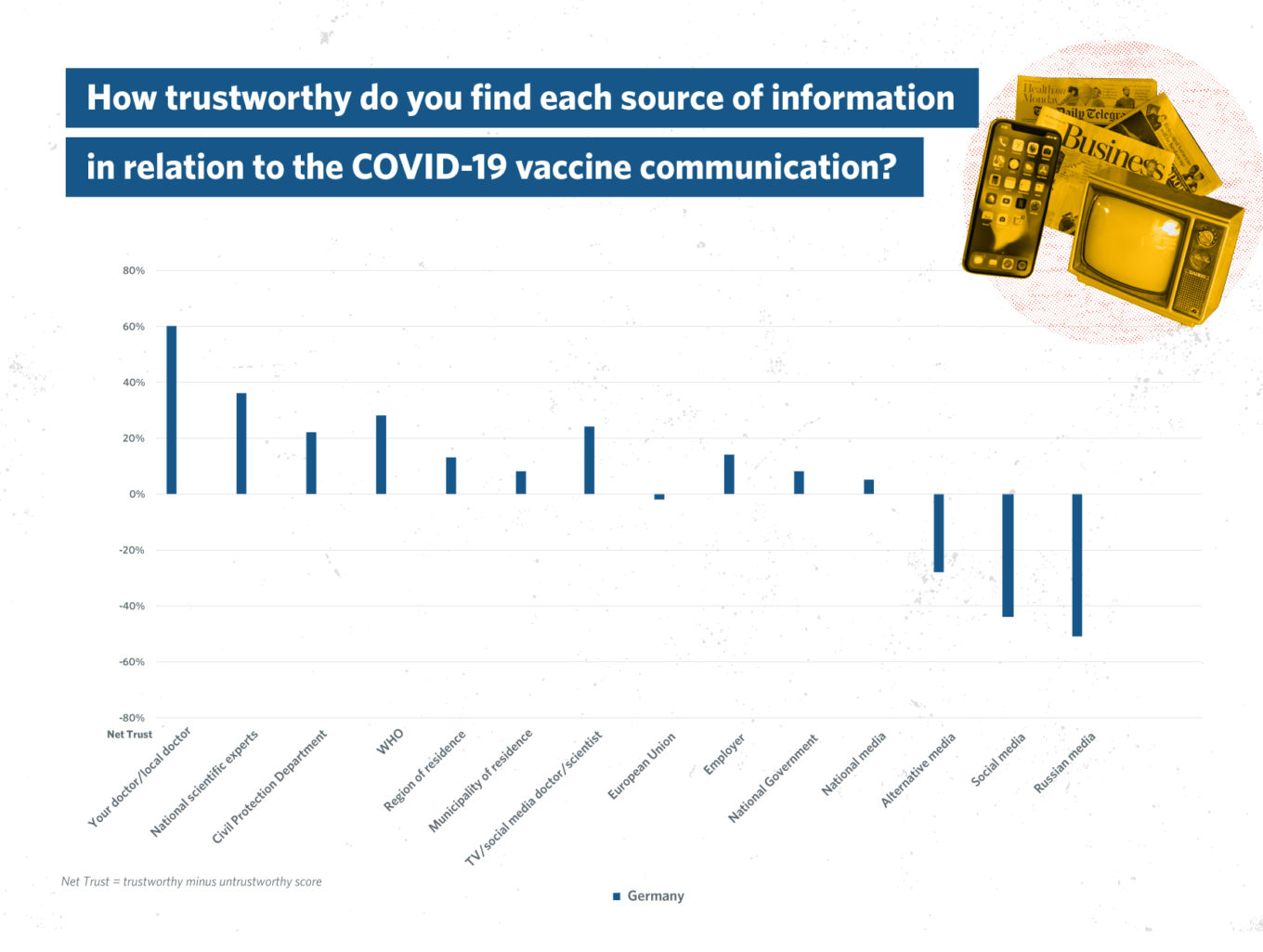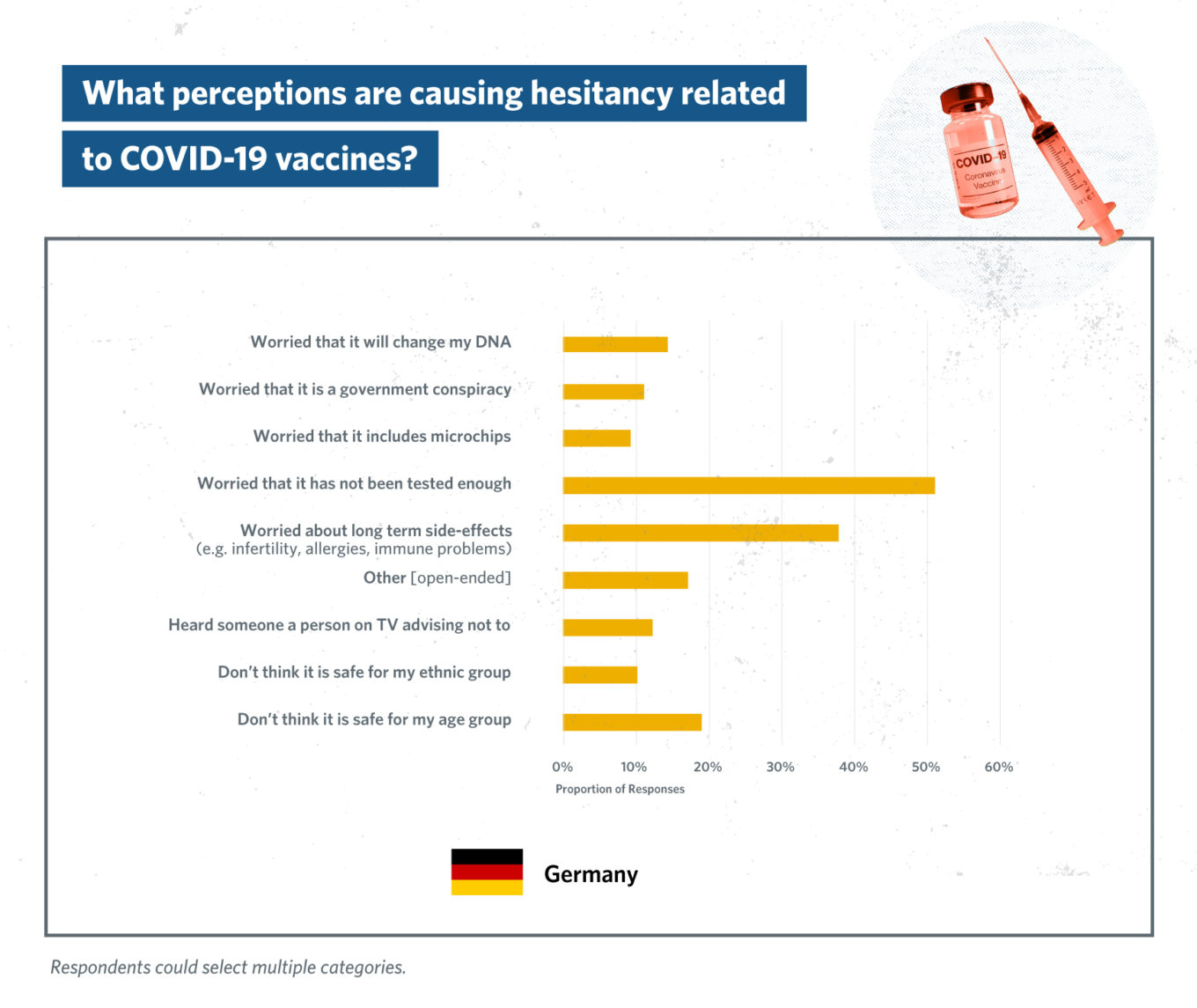Vaccine hesitancy and conspiracy mentalities in German: a deadly duo?
Words by Louis Bamberger
As we find ourselves at the one-year anniversary of the most severe health emergency of the modern era, we are still confronted with high infection levels and death rates overburdening our healthcare systems and economies. Vaccines offer a glimpse of light at the end of the long tunnel but rising anti-vaccine sentiments in the wake of the COVID-19 pandemic give cause for concern.
This threat is particularly evident in one of Europe’s most populous countries, Germany, where the global surge in COVID-19 cases was met by a national rise in conspiracy theories and vaccine opposition. People from across the political spectrum came together to express anger towards the government and ‘big pharma’, skeptical of the influence that industry and scientific elites have on the current system. It may be tempting to solely blame COVID-19 for these trends, however a closer look reveals those are not necessarily new.
A 2019 study by the Friedrich Ebert Foundation found that almost half of the respondents expressed a belief that secret organisations were driving political decisions. 38% of Germans were shown to have had a ‘conspiracy mentality’, of which 25% indicated they were ready to achieve their political goals by violence. These figures indicate a hotbed for conspiracy ideologies surrounding COVID-19 which would arise the subsequent year.
Times of crisis are predestined to reinforce insecurities, doubts and fears among members of the population. Germany has proven no exception to this phenomenon, particularly due to the highly emotional dimension of the COVID-19 debate which has lured people away from science and facts toward less conventional answers to the difficult challenges we are facing.
To understand who Germans trust for information related to COVID-19 vaccines, FH Brussels conducted a survey with our inhouse Research and Measurement group, TRUE Global Intelligence, to measure trust levels for 14 different information sources. The highest level of trust by far was expressed for personal/local doctors (60%), followed by national scientific experts (36%) and the WHO (28%). This can certainly be attributed to the more intimate and trusting relationship most patients have with their own doctors, and the great amount of skepticism towards everyone associated with the ‘establishment’ – or, to put it in less dramatic terms, the government.
Unsurprisingly, our findings show Germans seem have a low level of trust for their national government and even negative levels of trust for the European Union. This is undoubtedly due to the perception of conflicting messaging, chaotic lockdown measures and botched containment attempts, not to mention the relatively slow rollout of vaccination campaigns in Germany and the wider EU.
Although Health Minister Jens Spahn has continuously championed EU-level joint procurement as the right decision, critics have voiced dissatisfaction over the slow approval process. Meanwhile, national government officials, political parties and the 16 federal states have consistently failed to see eye-to-eye related to different pandemic strategies, complicating the situation further.
In our survey, those who indicated they were against taking the vaccine were presented with a multi-choice list of reasons to indicate why they were hesitant. Over half of respondents indicated concerns the vaccines had not been tested enough (51%), followed by concerns of potential long-term side effects (38%), and concerns about safety for their age group (19%). A small, but noticeable group (11%) directly indicated their concern that vaccines are a government conspiracy.
The remaining question is: what needs to be done to increase the willingness to get vaccinated against COVID-19 in Germany? The good news is that the rate of Germans willing to get vaccinated against COVID-19 seems to have risen throughout the course of the pandemic. However, the hesitancy will remain unless we address the reasons for this skepticism.
As the majority of Germans seem to be worried about a perceived lack of safety and efficacy, there is a huge opportunity for science-based information regarding results and reassurances about the testing process to help encourage informed decisions when it comes to vaccines. By addressing wariness towards new vaccine technologies and worries about side effects, we have a better chance of reaching people and turning concerns about vaccines towards the real problem: the pandemic.
Check out our full report for more insight!
-

Haven is a policy and political outreach specialist who supports clients in health sectors by directing engagement with Brussels stakeholders. Prior to joining FleishmanHillard, she worked as head of office for a Member of the European Parliament on two committees: Environment, Public Health and Food...
-

Emma leads FleishmanHillard EU’s Health and Lifesciences team, providing public affairs and corporate communications sectoral expertise to clients. Emma has worked on high-profile pieces of EU health legislation, including the General Pharmaceutical Legislation and EU-wide HTA, and has a particular passion for supporting clients to...
Find Out More
-
Generative AI is changing the search game
May 8, 2025




